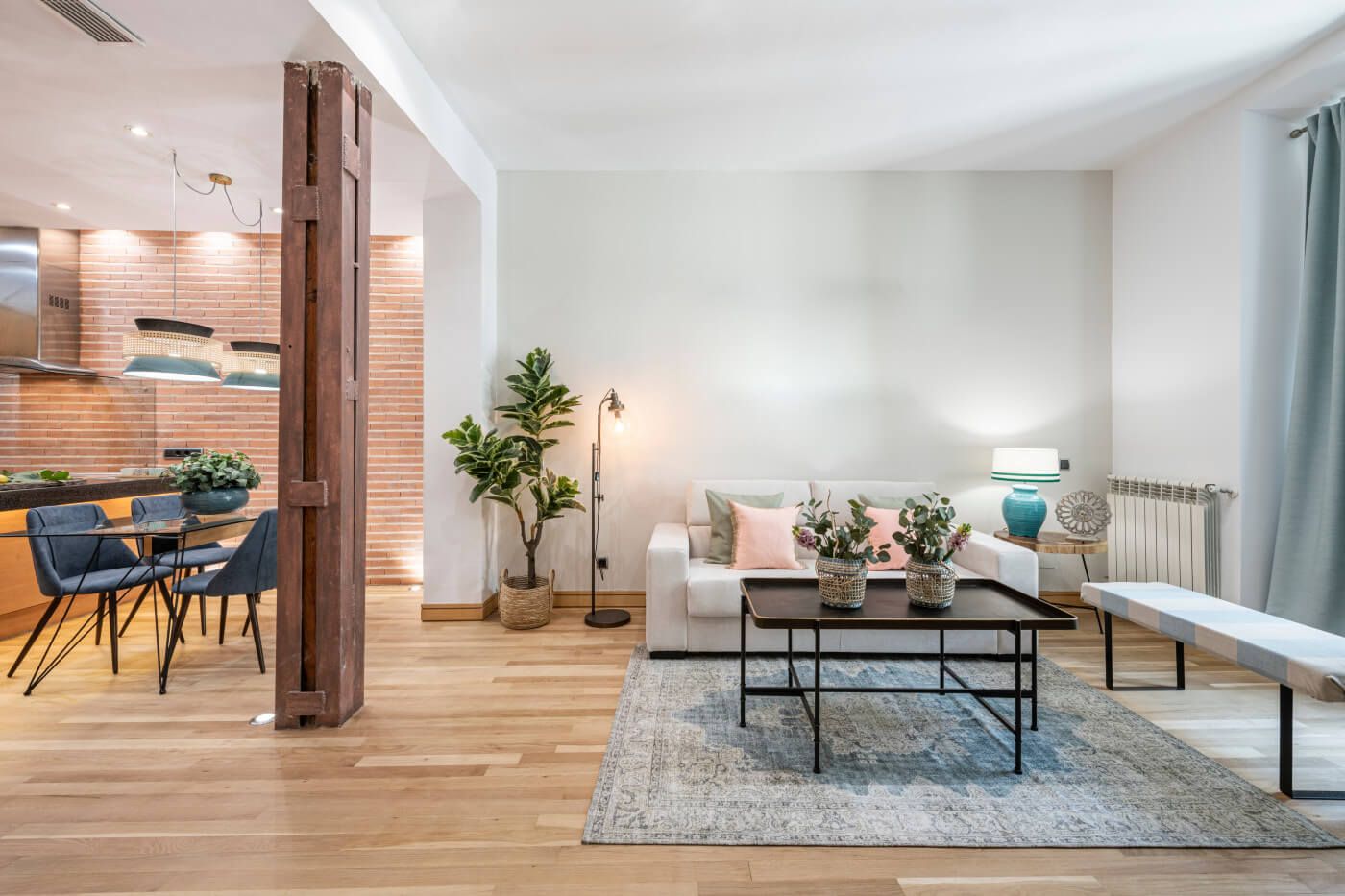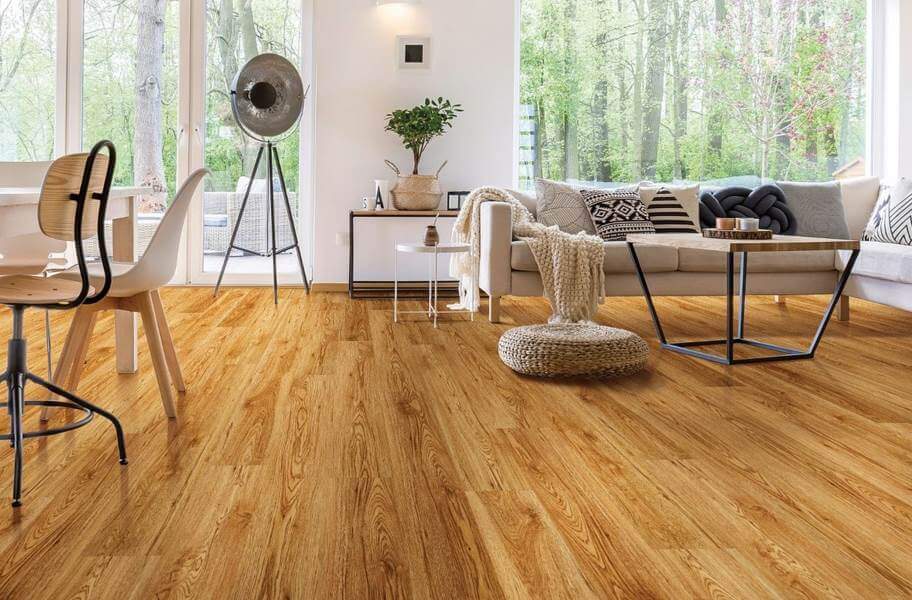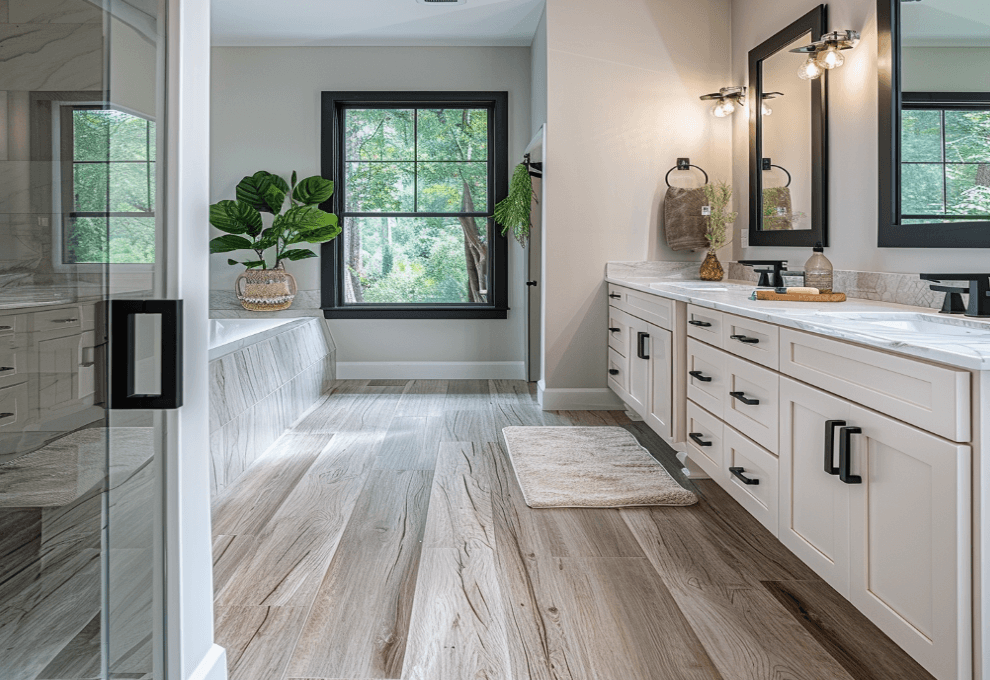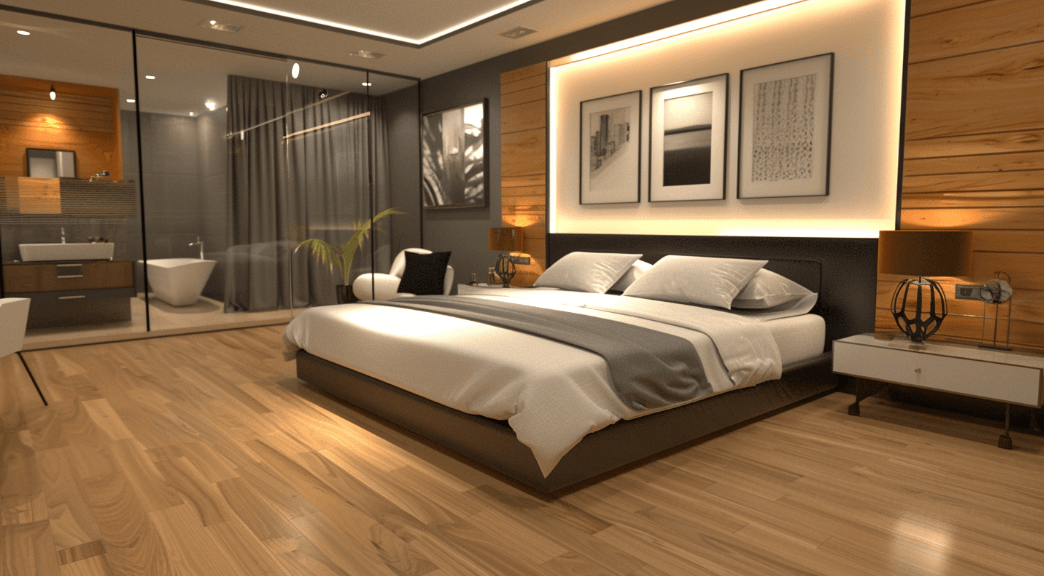Vinyl flooring offers a surprising combination of benefits that make it an interesting choice for your home. It's no surprise that it has exploded in popularity in recent years.
Today's luxury vinyl options (like LVP and LVT) are more convincing than ever. That means you can get the look of natural materials at an affordable price range.
Vinyl also doesn’t lag behind in durability. It performs rather well in busy environments and features water-resistant, if not even fully waterproof, qualities depending on the particular type and brand of vinyl flooring.
If you are considering vinyl flooring for your space, you are definitely on to something. Different types of vinyl offer appropriate solutions for almost any flooring situation, and we are here to explore what you stand to get if you decide to install it.
What is Exactly Vinyl Flooring?
Vinyl flooring, in its essence, is a synthetic flooring made primarily of PVC, which stands for polyvinyl chloride. PVC is a versatile plastic material created by combining chlorine and ethylene (derived from petroleum).
The reasons behind PVC's success in flooring are that it is inherently waterproof, durable, and easy to maintain. All the qualities you would want to see on your floors.
In addition to PVC, vinyl flooring also features a set of other ingredients that all play a part in the end product. These include:
- Plasticizers: For flexibility and ease of installation.
- Stabilizers: To protect against degradation from heat and light.
- Fillers: To add bulk and reduce costs.
- Pigments: To provide color and design variations.
After carefully mixing these ingredients, sometimes at temperatures between 300-400 degrees Fahrenheit, you get a stable and durable vinyl plank.
Once you have the vinyl plank, the chosen design is printed directly onto a special film layer. Using the technology of high-resolution printing, we now have thousands of aesthetic options for vinyl flooring to choose from.
Finally, the wear layer is applied. In most cases, the wear layer is a transparent sheet of vinyl adhered to the top of the printed design layer. This layer gives vinyl its durability and protects it from scratches and all the daily wear and tear.
Pros of The Vinyl Flooring
When it comes to vinyl flooring, there are a lot of reasons you would want to see it in your home or even business environment. Let’s take a look at the qualities that make vinyl flooring so appealing:
Durability:
Vinyl handles high foot traffic incredibly well. It's resistant to scratches, dents, and stains, perfect for busy areas in your home. The top wear layer protects against scratches, scuffs, and even some tears. While quality definitely plays a role, most vinyl flooring is well-suited for pets.
Water resistance:
Vinyl flooring is water-resistant, to say the least. This means that you can't make a mistake if you put it in the kitchen or any other space where spills and some moisture are regular occurrences.
However, when it comes to fully waterproof qualities, you can find vinyl flooring that falls in this category, but you will most likely be looking at LVT or SPC vinyl if you want something fully waterproof for bathrooms or basements.
Easy maintenance:
Vinyl requires minimal upkeep, usually just sweeping and occasional mopping for cleaning. Cheaper vinyl can sometimes be sensitive to vacuum brushes, so stay away from aggressive vacuums like those made for carpet, and definitely stay away from steam mops.
Affordability:
Vinyl is one of the most budget-friendly flooring options. It offers stylish looks without a huge price tag.
- Sheet vinyl: The most affordable option. It can range from $0.50 - $2.00 per square foot for materials. Installation adds about $2 - $4 per square foot.
- Standard vinyl planks/tiles: Expect around $2 - $5 per square foot for materials. Installation adds an additional $2 - $4 per square foot.
- Luxury vinyl planks/tiles (LVP/LVT): This is the higher-end option ranging from $5 - $12 per square foot for materials, plus $2 - $6 for installation.
Comfort:
Vinyl has a slightly padded feel underfoot, which makes it more comfortable to stand on for longer periods than hard surfaces like tile or wood. This is especially true when you pair vinyl flooring with proper underlayment that can increase comfort and reduce noise from footsteps.
Style variety:
Modern vinyl comes in a wide array of designs. It can mimic hardwood, stone, ceramic tile, and more. Also, modern vinyl flooring often has textured surfaces to make it look and feel more like the real thing. This means you might find vinyl that feels like wood grain, has the slight roughness of stone, or even includes raised lines like tile grout.
Cons of Vinyl Flooring
While vinyl flooring has a long list of benefits, it's only fair to explore the other side. Let's take a moment to discuss the cons of vinyl flooring to give you the full picture.
Shorter lifespan:
While some higher-end vinyl can last for many years, cheaper options may wear out faster than materials like hardwood or tile.
On one end, you've got your entry-level sheet vinyl that might come with a warranty of around six years, which, in the grand scheme of home flooring, isn't a whole lot of time. On the other end, premium vinyl products, particularly the rigid types, can have warranties that span up to 30 or even 35 years.
Environmental concerns:
Vinyl production and disposal can have environmental impacts. Some vinyl releases VOCs, though low-VOC options are available. If this is of particular concern to you, be sure to always check for green-guard certificates.
No refinishing:
Unlike wood, you can't refinish vinyl if it gets damaged or you want a new look. Replacement is the only option. The good news is that replacement is rather easy with the click-clock installation method for vinyl flooring. On the other hand, glue-down installation might cause some annoyance when it comes to replacement.
It requires a perfectly smooth subfloor:
Vinyl shows imperfections in the subfloor beneath, so careful preparation before installation is important. While this is true for most flooring installations, this is of particular concern for vinyl flooring because vinyl is known to telegraph imperfections beneath.
Sunlight fading:
Prolonged sun exposure can fade some vinyl flooring over time. This isn't a universal trait across all vinyl flooring, but it's something to consider, especially for rooms bathed in sunlight for the better part of the day. The impact of UV rays can gradually diminish the once-vivid patterns and colors, leaving floors looking a bit lackluster.
Vinyl Offers Something for Everyone
Vinyl flooring isn't a one-size-fits-all solution. The industry has come a long way, offering a diverse range of types to cater to various needs and preferences.
Need something durable for high-traffic areas? Luxury vinyl planks (LVP) are water-resistant and tough. Looking for a budget-friendly option for a less-used space? Basic sheet vinyl provides a cost-effective solution.
Modern options mimic the beauty of wood, stone, tile, and more, with realistic textures and a vast array of colors and patterns.
The vinyl industry has constantly evolved to address consumer needs. Originally known for its affordability, vinyl has grown much more sophisticated.
Manufacturers are increasingly focused on eco-friendly practices, with low-VOC options and potentially recyclable materials.
With all these advancements, vinyl offers something for almost everyone. It provides a balance of affordability, style, and performance to suit a wide range of requirements.












